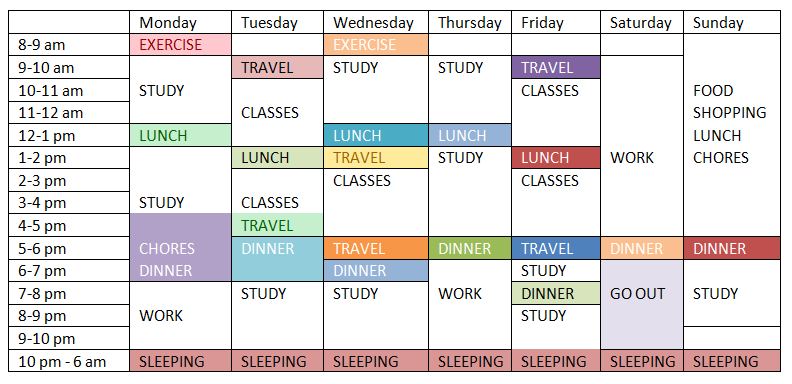Studying is a crucial part of our academic success. However, many students complain that they do not have enough time to study. The easiest way to arrange study time is to make a good plan.
A study plan is a schedule that outlines study times and learning goals.
“Four steps to achievement: Plan purposefully. Prepare prayerfully. Proceed positively. Pursue persistently”
William A. Word
For any student, making a study plan and keeping it is a challenge. Many students fail to balance study times, socializing, and relaxing times.

The study plan doesn’t mean that it just contains study periods, contents, extent, and duration. It includes your inclination, personal choices, and personal decision. By a balanced plan, your mind will be more receptive during time devoted to studying.
Contents
Benefits of a lesson plan
A study plan is a helpful tool that reminds you of what goals or objectives you want to achieve. Objectives and goals will help you become more knowledgeable on a specific subject or field.
A study plan can help you to develop a serious studying habit. Creating a study plan will help you become more organized, self-disciplined and build your determination to complete your studies.
A study plan helps you to develops strong time management skills. It helps you to study as many subjects and lessons as possible.
The study plan helps you to study and increases study productivity. But if there is no willingness to study, there is no plan that can help you.
SUGGESTIONS FOR CREATING A STUDY PLAN
Use short, frequent study sessions. Make each study session 25 minutes, like in the Pomodoro technique. The human brain understands academic material faster and better, if done in short blocks of time, spread out over more extended periods.
For example, you perform better on an exam if you spend 2 hours each day for 15 days than spending 10 hours each day for three days before an exam.
You may notice better than anyone the shortcomings in your study plan. You may ask someone to help you with an effective study plan. However, keep in mind that no one can prepare the best study plan for you. Every student has different schedules, strengths, and weaknesses. Focus on what weaknesses you want to improve.
Have breaks during a study session to keep you fresh and alert. Do nothing relate to studying during that time. Get up, roam around, do exercise, activate your muscles. Don’t Take extra breaks or prolonging breaks because it can sabotage your plan. Avoid distractions that could prolong your break.
Start early!
The key to performing well on exams depends on starting early. As Benjamin Franklin said, “early to bed and early to rise makes a man healthy, wealthy and wise.” Sleeping early and Starting early is a fundamental part of our study plan.
There is no perfect plan. In some cases, you can make some minor changes to the plan. For example, when you are sick or one of your relatives is sick, you can make some changes to your plan when you have very important work.
Schedule time for nonacademic activities. If you schedule several long days just studying, you will get exhausted, discouraged, and be tempted to give up. Plan time for nonacademic activities, such as exercise, hobbies, and socializing. These activities are vitally important for your brain health.
As time goes by, your strengths and weaknesses will change. Hence, your lesson plan must be customizable, adaptable to those changes. You must continually update your plan as you go through the process. If you feel there is no progress in your study, there is no point in continuing it. Make changes when you work out what’s right for you. Having a record and tracking your progress enables you to realize your weaknesses.
Stick to the plan
There is no point in making a study schedule if you don’t stick to it. A study plan works best if it is followed consistently. Use an alarm on your mobile to alert you when your study blocks begin and end.
Procrastination is the thief of time.
How to create a study plan
Now, it is time to create a study plan in light of suggestions.
1. Create a time chart
First, specify how much time you spend on your personal and academic activities. You should take notes about your daily activities, estimate how much time you spend each day when you are at school, work, or home with your family for a day. Creating a time chart helps you to find a consistent time for studying. A sample time chart is given below. Create your own time chart.

2. Determine study goals
Determine your study goals. What do you need to study? What do you need to achieve? These questions will help you plan out what you should prioritize in your study plan.
Set realistic study goals. Many students don’t know what a realistic study goal is. Questions like “How many hours can I study a day?” “How many chapters can I finish a day?” may help you to determine your goals. In the beginning, set simple goals that you can easily achieve. As you achieve your goals, you will have more self-confidence.
3. Develop a plan
Your time chart and study goals are ready now. It is time to develop a plan. You will develop a study schedule based on time charts and goals. The key to staying fresh and alert during a long study session is to have lots of breaks.
You may ask someone to help you with an effective study plan. However, keep in mind that no one can prepare the best plan for you. You may notice better than anyone the shortcomings in your plan. Every student has different schedules, strengths, and weaknesses. Focus on what weaknesses you want to improve.
References
- https://www.youtube.com/watch?v=gSeLwhqREeA&t=4s
- https://www.tabegitim.com/en-iyi-ders-calisma-plani-nasil-yapilir/
- https://www.wikihow.com/Create-a-Study-Schedule

